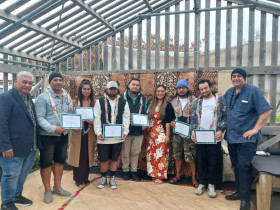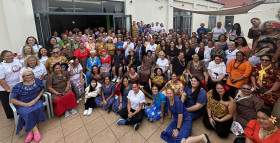2024 – A YEAR IN REVIEW
For the past decade and more, Pasefika Proud has worked with Pacific communities to develop and deliver Pacific responses to Pacific issues. In that time, we have highlighted key issues facing Pacific people in Aotearoa and the need for community-led solutions that aim to prioritise prevention.
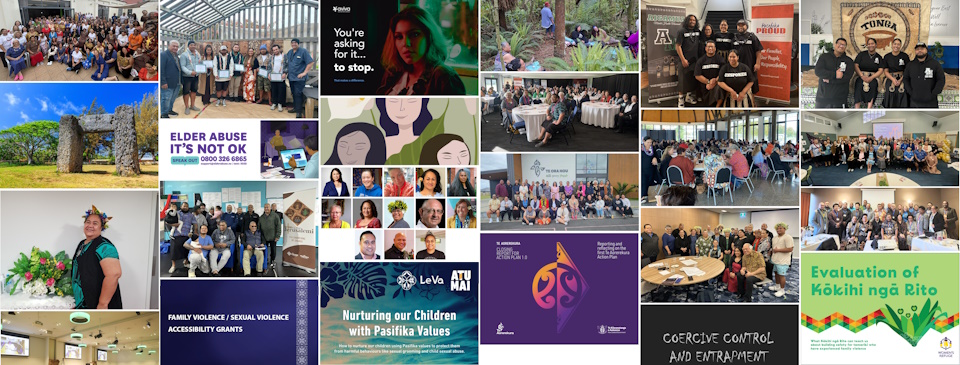
The action and approaches taken have changed over the years in response to evidence, policy development, community voices, and, of course, needs.
Because of this, we commissioned an evaluation of our work, Celebrating Pasifika Proud - 10 Years On, aiming to demonstrate the progress achieved through our activity.
It wasn't just an opportunity to look back and feel good about our efforts, it was also a chance to make sure we were on track to deliver positive change for Pacific families.
Partnering with the team at Moana Connect for the evaluation, the findings will help decide the best way forward for the betterment of our people.
Any change we have been able to make over the past decade is due to the help we received along the way from our key partners - providers, community groups etc - who have been with us along the way. Their participation has been crucial to the Pasifika Proud journey and will also play a big part in next steps to serve the needs and aspirations of our communities.
But evaluating our own work did distract us in our support of other community initiatives. Here are just some of the highlights of the past year.
READ MORE on Celebrating Pasefika Proud - 10 Years On
COMMUNITY ORGANISATIONS DELIVERING KEY SERVICES
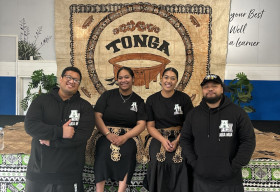 The work being done in the area of mental health in the Hawkes Bay area by the AIGAMUA group goes from strength to strength. Set up as a response to the rise of young people in the area suffering mental health issues, for the past year AIGAMUA dedicated itself to a health model to ''give hope to our people.''
The work being done in the area of mental health in the Hawkes Bay area by the AIGAMUA group goes from strength to strength. Set up as a response to the rise of young people in the area suffering mental health issues, for the past year AIGAMUA dedicated itself to a health model to ''give hope to our people.''
READ MORE - A Historic Day in Hawkes Bay
Also run by AIGAMUA, with the support of Pasifika Proud, five families, in Hawkes Bay, took part in a series of videos to help break down the stigma surrounding mental health in Pacific communities.
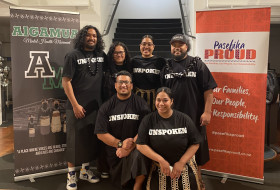 Calling it "The Unspoken Family Series", AIGAMUA said the five family dynamics - Mother/Daughter, Husband/Wife, Siblings, Autistic Family and Men's Kava Club - underpinned the key pillars of Family First and the aim was to shed light on problems faced and to give hope to people suffering with their mental health.
Calling it "The Unspoken Family Series", AIGAMUA said the five family dynamics - Mother/Daughter, Husband/Wife, Siblings, Autistic Family and Men's Kava Club - underpinned the key pillars of Family First and the aim was to shed light on problems faced and to give hope to people suffering with their mental health.
Pasefika Proud's Tuta Visesio-Pita was at the launch of the videos and said speaking about what was previously unspoken gave "hope and inspiration "to those suffering with mental health issues. READ MORE - The Unspoken Series
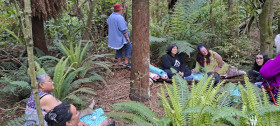 In Southland the Pasifika Women's Healing Collective was empowering women to heal and break cycles of violence through ( among other ways) creative arts therapy.
In Southland the Pasifika Women's Healing Collective was empowering women to heal and break cycles of violence through ( among other ways) creative arts therapy.
Through art, women explored the silence surrounding family violence and sexual harm, while confronting the impact on their lives and those of their loved ones.
Facilitator Ingrid Campbell said the programme used creative arts as a vehicle of self-expression and she described the women taking part as inspirational. READ MORE - Empowering Pacific Women
"The women weren't afraid to be seen. From day one they brought their vulnerabilities and embraced the opportunity to use their voice and speak truth."
 In Christchurch, the Aviva group was to the forefront of a number of initiatives, including a campaign encouraging people to speak out to highlight family harm and sexual violence. This followed the release of figures showing more than one million adults in Aotearoa - around 27 per cent of the population - had experienced at least one act of sexual violence.
In Christchurch, the Aviva group was to the forefront of a number of initiatives, including a campaign encouraging people to speak out to highlight family harm and sexual violence. This followed the release of figures showing more than one million adults in Aotearoa - around 27 per cent of the population - had experienced at least one act of sexual violence.
The group's general manager, Gwenda Kendrew, said sexual violence thrived in society when unhealthy attitudes and behaviours were allowed to continue, and it was time to stop looking the other way. READ MORE - Aviva's STOP IT campaign.
"Sexual violence is all too common, it's not enough to think someone else will say, or do, something to make it stop," she said.
Another highlight was its involvement in Suega, a course helping families in Christchurch overcome family violence.
One of the aims was to provide Pasifika men with the tools and education to change their behaviours and stop the use of violence.
Graduates of the course demonstrated a marked reduction in incidents of family violence, reconnection with family and culture and a feeling that they were better equipped to thrive within New Zealand society. READ MORE Seuga graduation.
A countrywide success story was the work of P.A.C.I.F.I.C.A which delivered many initiatives to help keep Pacific women and girls safe. A wellbeing report highlighted initiatives, from Whangarei in the north to Invercargill in the south which delivered success around family violence prevention.
It may have been something as simple as a breakfast meeting to sit and talk, through to self-defence classes, a two-day workshop called "Creating Peaceful Pathways", or a Youth Retreat on the Kapiti Coast where the issue of harmful digital communications proved a popular topic. READ MORE - PACIFICA Advocates for Pacific Women and Girls.
Nga Vaka o Kāiga Tapu
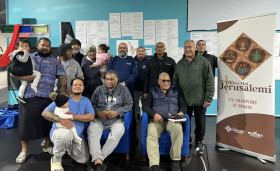 The community-developed, community-owned and community-mandated initiative had a busy year, with a highlight being the work with NZ Police in the group's Champions of Change (CoC), aimed at addressing critical issues in Pacific communities such as family harm, youth challenges and navigating the NZ legal system.
The community-developed, community-owned and community-mandated initiative had a busy year, with a highlight being the work with NZ Police in the group's Champions of Change (CoC), aimed at addressing critical issues in Pacific communities such as family harm, youth challenges and navigating the NZ legal system.
Senior Sergeant Sanalio Kaihau said the collaborative effort had paid dividends and because of it there was now a deeper understanding and mutual respect between police and Pacific communities who were working together to create safer, more supportive environments for families.
He said while, at first, there was some hesitancy from some of the youngsters involved, that had now changed.
"The consistent presence of familiar faces from the police force has been crucial in building trust and confidence," he said.
And this trust is reciprocated, with the community showing an increased willingness to interact with the police and seek out help.
Nga Vaka o Kāiga Tapu praised the police for the way they had tailored their approach to align with the specific needs and values of different ethnic groups.
It's clear that the partnership is a model of how culturally informed approaches can lead to effective and sustainable solutions.
Also, within the Nga Vaka o Kāiga Tapu framework in the past year was a family violence training programme aimed at the Tuvalu community.
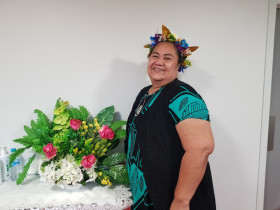 Among the participants was Alamai Sioni who said it was the sort of initiative that would benefit many in the community who normally would not have access to such information.
Among the participants was Alamai Sioni who said it was the sort of initiative that would benefit many in the community who normally would not have access to such information.
She said having worked in various government and educational roles over the years she felt confident she knew where to connect and find assistance, but others would not be in such a fortunate position.
Alamai said her people needed to break the "culture of silence, mentality".
"It needs to be taught that the behaviour can change, and they won't lose face if they change too," she said.
"Especially if they're changing to be accommodative to loved ones."
READ MORE - One Year On : The Police and Champions of Change | READ MORE - From a Culture of Silence to a Culture of Change
ROLE MODELS, SUCCESS ACKNOWLEDGED AND CELEBRATED
Pacific people from across a variety of fields of expertise were acknowledged in the 2024 New Zealand New Year Honours List.
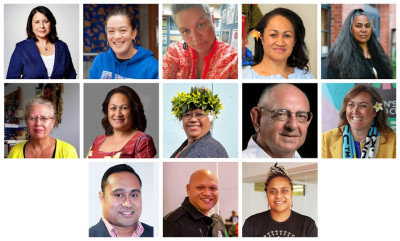 Among them was Dr Tamasailau Suaalii-Sauni, recognised with a MNZM (Member of the New Zealand Order of Merit) for service to education, but also for her work in the NZ Criminal Case Review Commission as well as being a member of the Pacific Reference Group of the NZ Royal Commission of Inquiry into Abuse in Care.
Among them was Dr Tamasailau Suaalii-Sauni, recognised with a MNZM (Member of the New Zealand Order of Merit) for service to education, but also for her work in the NZ Criminal Case Review Commission as well as being a member of the Pacific Reference Group of the NZ Royal Commission of Inquiry into Abuse in Care.
She arrived in Aotearoa from Samoa when she was three and was the first in her family to attend University, Tamasailau did a law and arts degree, majoring in sociology. She went on to study for her Master’s then a PhD in sociology, exploring the relationship between law, culture, and legality.
Another who stood out in the field of education was Professor Yvonne Jasmine Te Ruki Rangi o Tangaroa Underhill-Sem who, like Dr Suaalii-Sauni, received an MNZM, in her case for services to tertiary education and Pacific development.
The Professor, a researcher and teacher of Pacific Studies at the University of Auckland, said she was both "humbled’’ and "gratified’’ for the acknowledgement as few Pacific people make it into the tertiary sector, and those that do work hard at getting more Pacific people involved.
CEO of The Fono, Tevita Funaki, was another to get an MNZM, for service to Pacific health.
The Fono has worked hand-in-hand with Pasefika Proud over the years on many projects.
But he has also found time to be involved with the Ministry of Social Development Pacific Steering Group as Chair, playing a role in developing a Pacific Prosperity Strategy and Action Plan, intended to shape cultural capability in response to an ever-changing context.
Another who can now put MNZM after their name is Lemalu Silao Vaisola Sefo, CEO of the South Seas Healthcare, a role he has held for more than seven years. The Samoan-born, former professional rugby player, graduated from Otago University.
He strongly advocates that achievements in Pacific Health result from embracing a collaborative village-style approach.
A high-profile recipient was Barbara Dreaver, a familiar face to those who follow Pacific and community news. Her work in investigative journalism and also in Pacific communities has led to her receiving an ONZM (Officer of the New Zealand Order of Merit).
Other Pacific honourees in the 2024 list were:
Sarai-Paea Bareman who received a DNZM (Dames Companion of the New Zealand Order of Merit) for her services to football governance.
Dr Cherie Maria Chu-Fuluifaga for services to education and Robert George Holding for services to Pacific literature and business, both receiving an ONZM.
Four more recipients were honoured with an MNZM, they were Christine Mary Hundleby (service to Pacific arts), Philippa Agnes Laufiso (services to arts and the community), Tupe Lualua (services to arts) and Makerita Urale (services to Pacific arts).
The Queens Service Medal (QSM) was given to Rai Vaeruarangi for service to the Cook Islands community.
RAISING AWARENESS
As always, some groups looked to the Pacific community to help pave the way for innovative change.
 Among them was the Coalition for the Safety of Women and Children, which called for stalking to be made illegal in Aotearoa.
Among them was the Coalition for the Safety of Women and Children, which called for stalking to be made illegal in Aotearoa.
It called for government to follow the lead of countries such as Australia and the UK, where stalking is banned.
The Coalition said, without such a law, it was difficult, bordering on impossible sometimes, for victims to get the protection they needed.
It encouraged those in the Pasifika community to sign a petition it was planning to present to Justice Minister Paul Goldsmith in an effort to get him to make good on noises he made prior to the last election when in opposition. READ MORE - Calls for Stalking to be made illegal
Another area of awareness, highlighted by Pasifika Proud, was that of elder abuse.
The Office for Seniors, shed light on startling figures and acknowledged the pressing need to support diverse communities which include Pacific. It showed around one in ten older people in Aotearoa experienced some kind of abuse and in many cases ignored or not recognised.
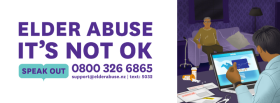 Elder abuse took many forms, ranging from psychological, financial, physical through to neglect, and in many cases the abuser was someone close to home that the older person relied on for support or care.
Elder abuse took many forms, ranging from psychological, financial, physical through to neglect, and in many cases the abuser was someone close to home that the older person relied on for support or care.
Two publications on signs of abuse and neglect were released by the office, Hidden Harm shone light on psychological abuse of the elderly, while Don't Look Away highlighted some of the less obvious signs of neglect, focussing on what wasn't done for the older person, rather than what was done to them. READ MORE | Elder Abuse
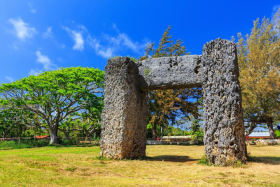 On a brighter note, we reported on the work being done for Pacific communities across New Zealand to help them determine their aspirations and discover how to achieve them.
On a brighter note, we reported on the work being done for Pacific communities across New Zealand to help them determine their aspirations and discover how to achieve them.
In 2024 it was the turn of the Tongan people to come under the spotlight, where, in conjunction with the Fofola Consultancy Ltd, we surveyed the community to discover their desires, thoughts and opinions and to give them the chance to contribute to this important work. READ MORE - Assessment of Investments for Tongan People in Aotearoa
EVENTS AND MILESTONES
Two Pacific communities that are well down the path to a community plan for their people are the Fijian and Cook Islanders.
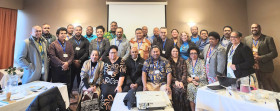 Our 18 Fijian communities received a boost in September when a group of leaders gathered in Wellington.
Our 18 Fijian communities received a boost in September when a group of leaders gathered in Wellington.
Most of those present had been involved in the launch and implementation of the 'Lalawa ni Tiko Vinaka' in 2022, and among the reasons for the meeting was to examine what progress had been made, what issues had presented themselves and how to address them.
One of the highlights of the meeting was the setting up of a national advisory board to represent and advocate for Fijian communities.
Fijian Community Project leader Sai Lealea said previous attempts to set up such a body had lacked a nationwide mandate.
"Fijians can now confidently engage with government and other stakeholders more effectively," he said. READ MORE - Fijian Community Plans Take Another Step Forward
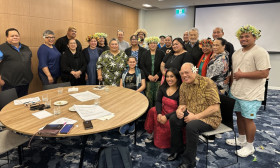 Also in September, Cook Islanders gathered in Auckland to talk about national priorities.
Also in September, Cook Islanders gathered in Auckland to talk about national priorities.
One of the central challenges was how to engage young people in the process. Delegates heard how, in the past, it had been tricky to keep young people involved for a variety of reasons.
They included the fact that many of their young people these days were multi-ethnic, and their other ethnicities were more influential, and also that traditional meeting formats failed to engage youth. Patrima Tauira, of Porirua had timely advice for the gathering on the latter issue.
"When you wanna bring our mapu together, we don't like sitting like this. Move the tables, get into groups, bring the drums in, get interactive," she said. READ MORE - Empowering Youth and Unity in Cook Island Communities : A Path Forward
"We thrive in cultural spaces ... Merge that with these formal settings. Then we'll get better engagement and hear their voices more."
But perhaps the biggest event of the year, was the series of Fono relating to the Pacific Practitioners Forum, where a series of six meetings were held up and down the country in an attempt to start the ball rolling on stopping Family Violence and Sexual Violence (FV/SV) in our Pacific communities. READ MORE - Pacific Practitioners' Forum Update
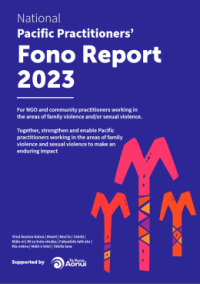 It was late in 2023 when Pasifika Proud first reported on how Pacific Practitioners were mobilising in response to the problems relating to family violence and sexual violence within Pacific communities. A major report was finalised early 2024 and plans turned into action resulting in a series of fono across Aotearoa. DOWNLOAD REPORT
It was late in 2023 when Pasifika Proud first reported on how Pacific Practitioners were mobilising in response to the problems relating to family violence and sexual violence within Pacific communities. A major report was finalised early 2024 and plans turned into action resulting in a series of fono across Aotearoa. DOWNLOAD REPORT
And what a success they proved to be.
The Chief Advisor of Te Puna Aonui, Liz Tanielu, which is supporting the National Komiti, said presentations provoked lots of discussion, which, at times, was "confronting and challenging".
But it was all in the spirit of better collaboration, and while the work was complex, she believed they were on the right track.
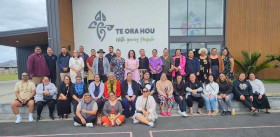 Her words were supported by community leader Te Hiwi Preston, a delegate at the Te Tai Tokerau event.
Her words were supported by community leader Te Hiwi Preston, a delegate at the Te Tai Tokerau event.
He said the two-day gathering brought a clear pathway to move forward.
"Our future mokopuna have the right to live in a world where they can thrive and participate without fear," he said.
Pacific Practitioners’ fono were also held in the South Island, Waikato, and Hawkes Bay.
READ MORE - Fono brings together South Island based Practitioners
READ MORE - Pacific Practitioners' Fono - Waikato, Bay of Plenty & Taranaki
READ MORE - Pacific Practitioners' Fono - Hawke's Bay & Tairawhiti

REPORTS AND RESOURCES SHARED
While we were happy to share our Pacific success stories in 2024, it’s also important to highlight the issues faced by our people. Challenges were highlighted in a series of reports shared with the wider community through Pasifika Proud.
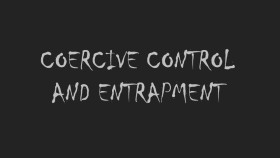 For instance, we reported on a March meeting at Auckland University between researchers and academics to attempt to better understand the problems of coercive control, described as a crime against people's ability to be self-determining.
For instance, we reported on a March meeting at Auckland University between researchers and academics to attempt to better understand the problems of coercive control, described as a crime against people's ability to be self-determining.
One of the biggest issues was that acts of control could be subtle and difficult to see as abuse. To better support victims/survivors it was essential that more was understood about coercive control the meeting was told. DOWNLOAD REPORT
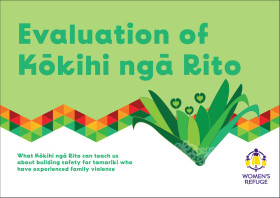 At the other end of the scale, in a New Zealand first, the thoughts and words of children aged 5-12, who were caught up in family violence situation, were heard.
At the other end of the scale, in a New Zealand first, the thoughts and words of children aged 5-12, who were caught up in family violence situation, were heard.
Those involved in the study admitted that for too long little attention was paid to the children in Pacific Island families, with the focus being mainly on the mums affected.
One said it was good to have input from the children when they were making decisions that would affect the whole family, and while they were happy with results so far, there was still a long way to go. DOWNLOAD REPORT
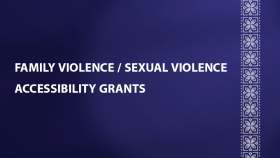 And a new report into FV/SV made grim reading for our Pasifika people.
And a new report into FV/SV made grim reading for our Pasifika people.
In it, the Ministry for Social Development (MSD) admitted gaps in the system meant those most at risk, including Pacific people, Tangata Whenua, LGBTQIA+ and ethnic communities were especially impacted.
MSD said while the report did not determine how gaps would be addressed; it did set out an understanding of what was missing in FV/SV services.
The plight of Pacific people was highlighted in the report with one of the main problems being the lack of workforce capability to understand the dynamics of FV/SV in Pacific communities. It called for a better understanding of Pacific values and cultural practices. DOWNLOAD REPORT
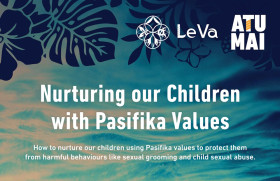 On a similar matter, a new community resource for parents and caregivers to help prevent child sexual abuse was launched by Pasifika-kaupapa organisation Le Va in November.
On a similar matter, a new community resource for parents and caregivers to help prevent child sexual abuse was launched by Pasifika-kaupapa organisation Le Va in November.
Describing nurturing as "a sacred duty" as children were at the heart of Pasifika families and society, the factsheets stressed a number of key messages Le Va wanted to get across.
They were that the relationship between children and parents/caregivers was sacred, applying Pasifika values in parenting which nurtured children's growth and wellbeing, recognising when those values may be misused and how sexual abuse harms children's development. DOWNLOAD REPORT
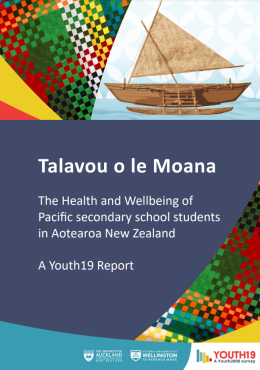 Early in the year there was plenty of positivity in the findings in Talavou o le Moana, Pacific Youth Health Report.
Early in the year there was plenty of positivity in the findings in Talavou o le Moana, Pacific Youth Health Report.
More than 1200 young people of Pacific background took part in a survey on topics such as health, wellbeing, family, faith, and educational issues.
Among the findings was that around nine in ten of those surveyed said they had a positive relationship with family, school, and church, were happy with their health and had thought about, or made plans for, their future.
On the other side of the coin there was still issues with racism (41%) and a third of the youngsters did not see a positive future for themselves in New Zealand.
Associate Professor Sir Colin Tukuitonga, said he was pleased with some of what he read.
"It's a positive story, some ... would have us believe our young people are nothing but troublemakers. There is overwhelming evidence that most of our young ones are doing well," he said. DOWNLOAD REPORT
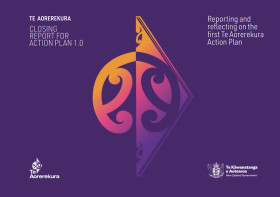 In a further positive development part two of a 25-year plan to help our people live free from violence was released.
In a further positive development part two of a 25-year plan to help our people live free from violence was released.
The follow up to Te Aorerekura Action Plan, was described by the Minister for the Prevention of Family and Sexual Violence, Karen Chhour as "an important milestone" which will build on the progress of the first plan.
As well as improving services it will provide improvements to protect children and young people, strengthen workforces and expand primary protection.
Ms Chhour said having spoken to many organisations doing good work in the prevention of FV/SV, it was clear the solution to the problem is in our communities.
And it is a problem, as FV/SV is at crisis point in New Zealand. It is believed 56 per cent of women suffer intimate partner violence.
Pasifika Proud is to the forefront of the government's campaign in acknowledging the power of cultural values and strength in preventing family violence and supporting Pacific peoples to thrive. Over the next few years, we will play our part in helping the government focus on areas to improve safety. DOWNLOAD REPORT
Alot is happening as we look ahead into 2025. With knowledge comes power, which is not especially useful towards transformation if kept silent. Diffusing data, insights, evidence, sharing of truth with unwavering intent and learning is critical to systems change.
Pasefika Proud works in partnership with communities to support ethnic-specific leadership and action that provides pathways to achieve our vision: Pacific families and communities are safe, resilient and enjoy wellbeing.
JOIN here to receive our e-newsletter
LIKE us on Facebook and Instagram
EMAIL US! We’d love to hear from you with questions, stories, feedback
